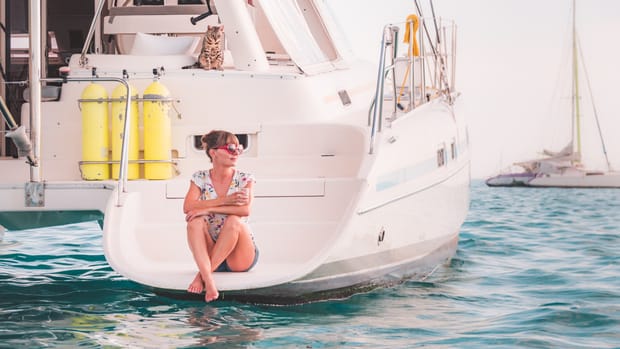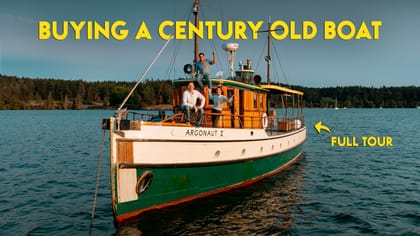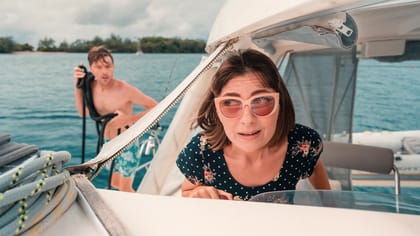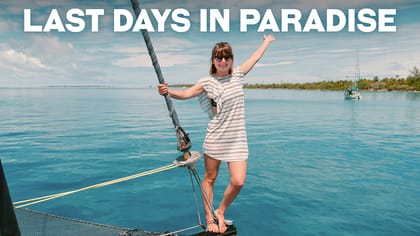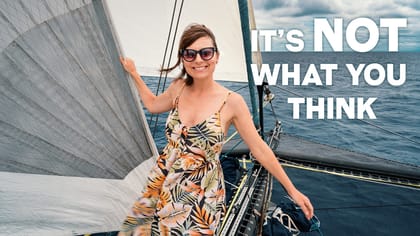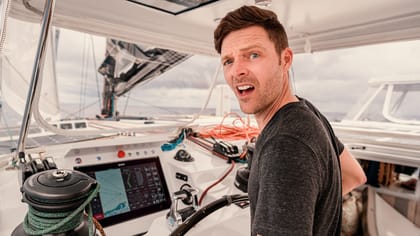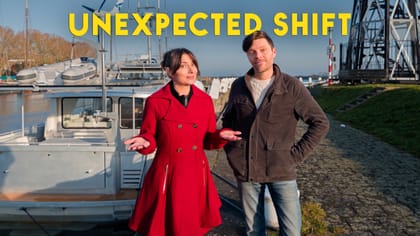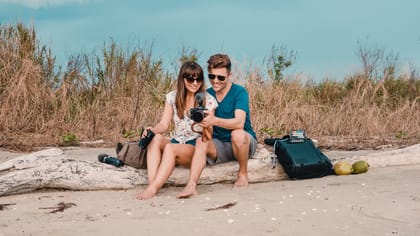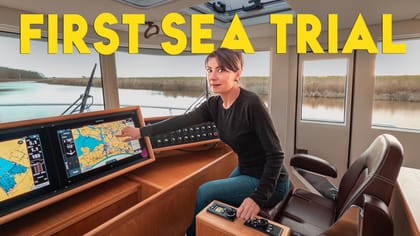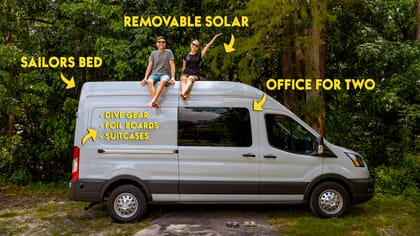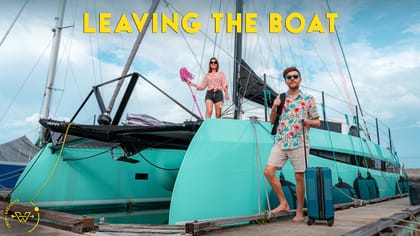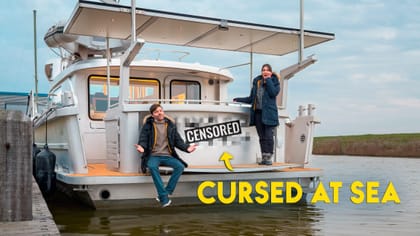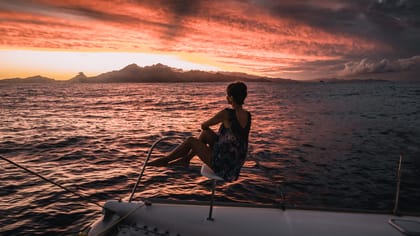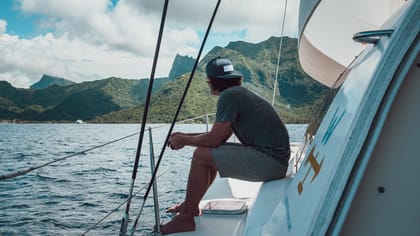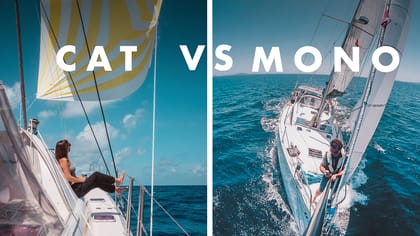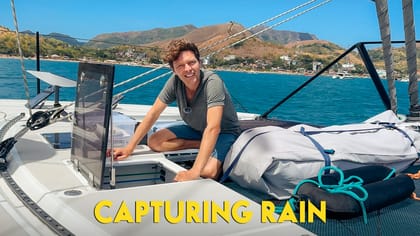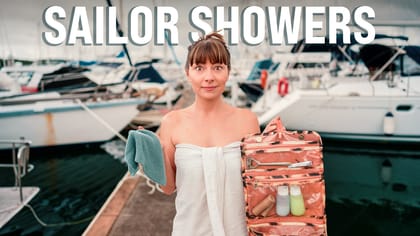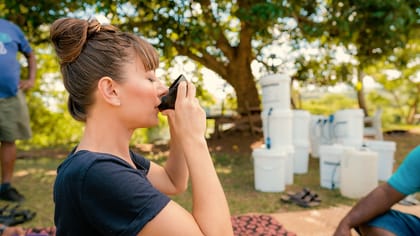How do we get water on a boat? You see us turn on a faucet and water comes flowing out, but where does it come from? That is a good question.
We’re completely off the grid, meaning we are our own water, waste management and electric provider. Which makes us hyper aware of all our resources. We’ve shared how we harness our electricity from the sun and store the power in our lithium batteries. Now we’re sharing how we get our most important resource, water!
Water is essential and arguably the most important resource to any human. We literally can’t survive without it. But getting, storing and using water on a sailboat can be a total pain in the aft! (sorry, I couldn’t help myself)
On average, we humans need about a 1/2 gallon of water per day. Exert yourself (as in move from one end of the boat to the other on a summer day in the tropics) and that amount goes up. Fun Fact: the human body can sweat up to a whopping 1 liter of water an hour. So, just to be on the safe side, we always have at least a two-week supply of drinking water (that’s fourteen gallons for the two of us).
We’ve been traveling and living off the grid for 9 years now (insert getting old joke here). In all that time we’ve never had to buy bottled water for our traveling home. Click the play button and join us aboard Curiosity for a chat about all things H20. We’ll show you the full scoop on how and where we get water while living on a boat.
How To Get Water
Finding water can be tricky, especially in the more remote parts of the world. But where there are any signs of life, there is water to be found. This applies to anyone living off the grid…where ever your boat, RV, van, mog or tiny house may be. There are a few different methods for getting water.
Rain Collection
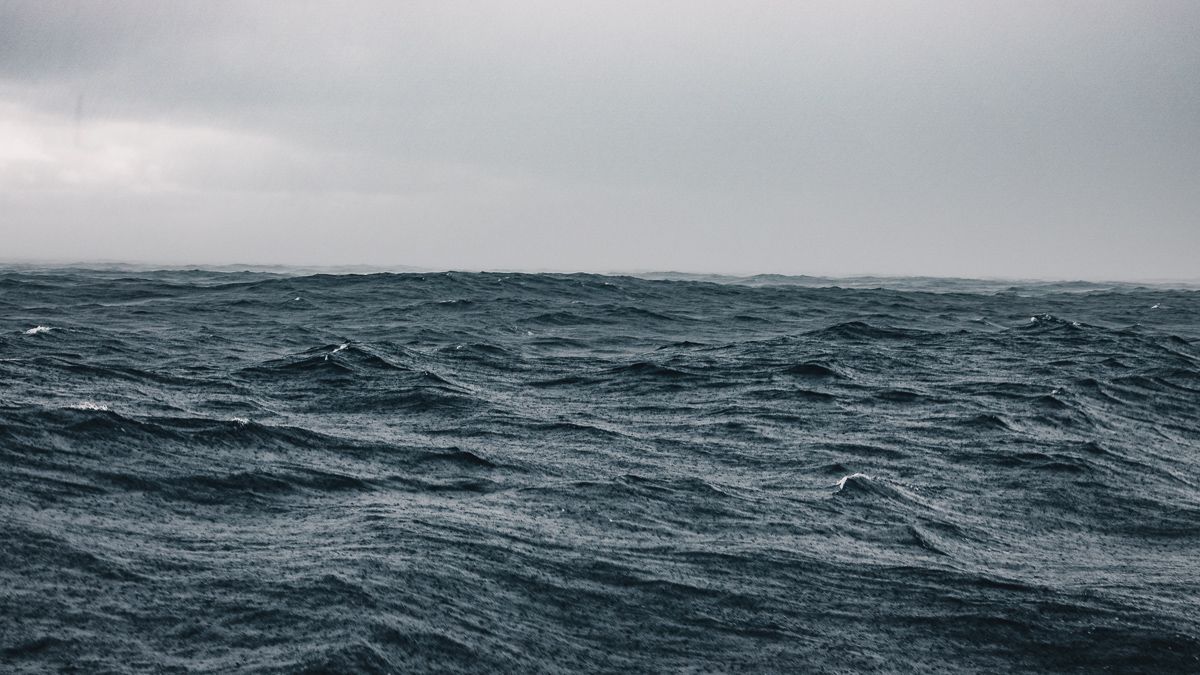
Collecting rain can be great for general cleaning and if you are in a particularly drench worthy part of the globe, it can be your constant source. We use buckets all the time to collect rain water and if we put tarps or got serious and put together a legit collection system, we could collect far more. Of course, along with catching water, we also catch microscopic creatures, bacteria, dirt, leaves, deck grime, fiberglass, get coat and who knows what else! Which is why…
Don’t Drink Rain Water Without Purifying it first!
We will talk about water filtration and purification in our next post/video, but I thought this was an important item not to gloss over.
Rain water is good water and can be great for drinking. It’s just not as pure as one might think.
I have seen lots of sailors, RV’ers, van lifers or off grid cabin owners simply collect water on tarps and dump it directly into their reservoir. While they might not get sick…they are putting themselves at serious risk. Add traveling to the mix and it’s a risk we don’t think is worth taking. Here is why.
Some rain is perfectly safe to drink…if it fell directly from the sky and touched nothing else on its way into your reservoir. But even then, rain water is only as clean as the atmosphere if fell through and the container its kept in.
The quality of rainwater will vary because air quality varies from place to place. Rainwater can carry bacteria, parasites, viruses, and chemicals that could make you sick. What is in the area? Airports, smoke stacks, big factories…so many variables to consider.
Which is why we highly recommended filtering and purifying rainwater before drinking it.
If you want more reading material on the subject, the Centers for Disease Control and Prevention has an article and sources here: https://www.cdc.gov/healthywater/drinking/private/rainwater-collection.html
Public Water Source
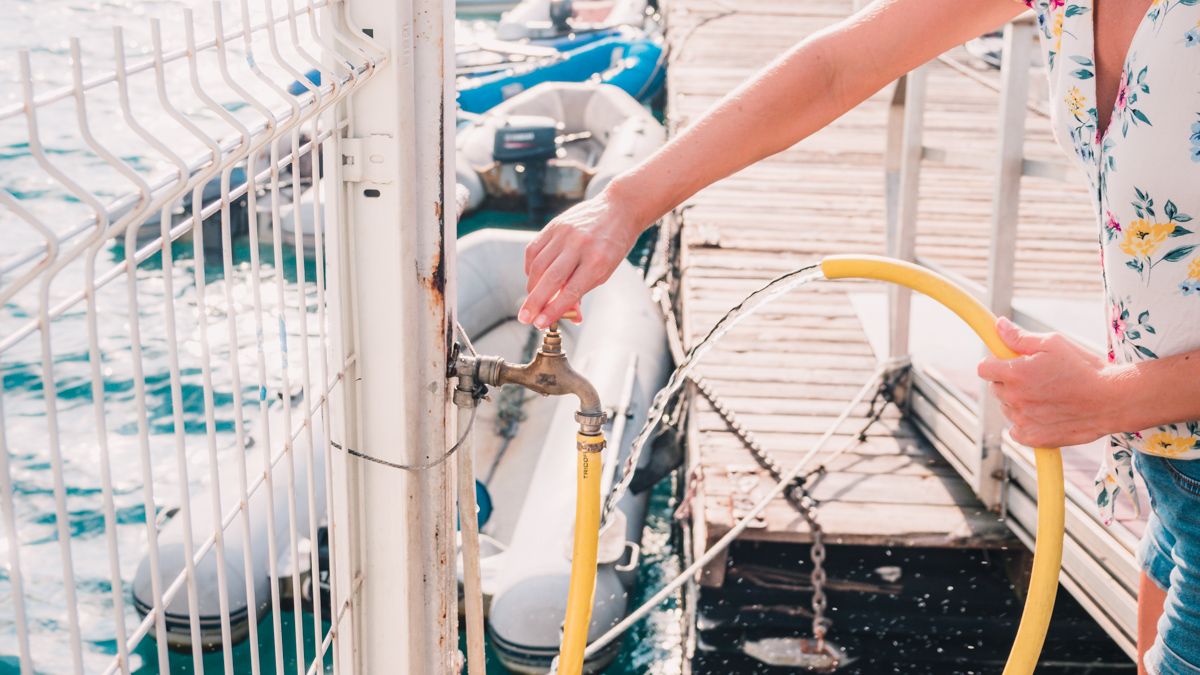
Marina, fuel station, or a public water filling station is most common…but sooo much to discuss here! Is it potable (safe to drink) or not potable? Is it free or for a fee?
If it is potable what are the conditions of the tap and/or hose? How sanitary is it? Who used it last and for what? How will you get it back to the boat? How do you feel about adding this water (and whatever is in it) into your water storage tank?
Many travelers don’t trust the public water sources or the person who used it before them (with fair reason) and don’t feel comfortable drinking it. So, they will use it for cleaning but buy purified water for drinking.
Buying Water
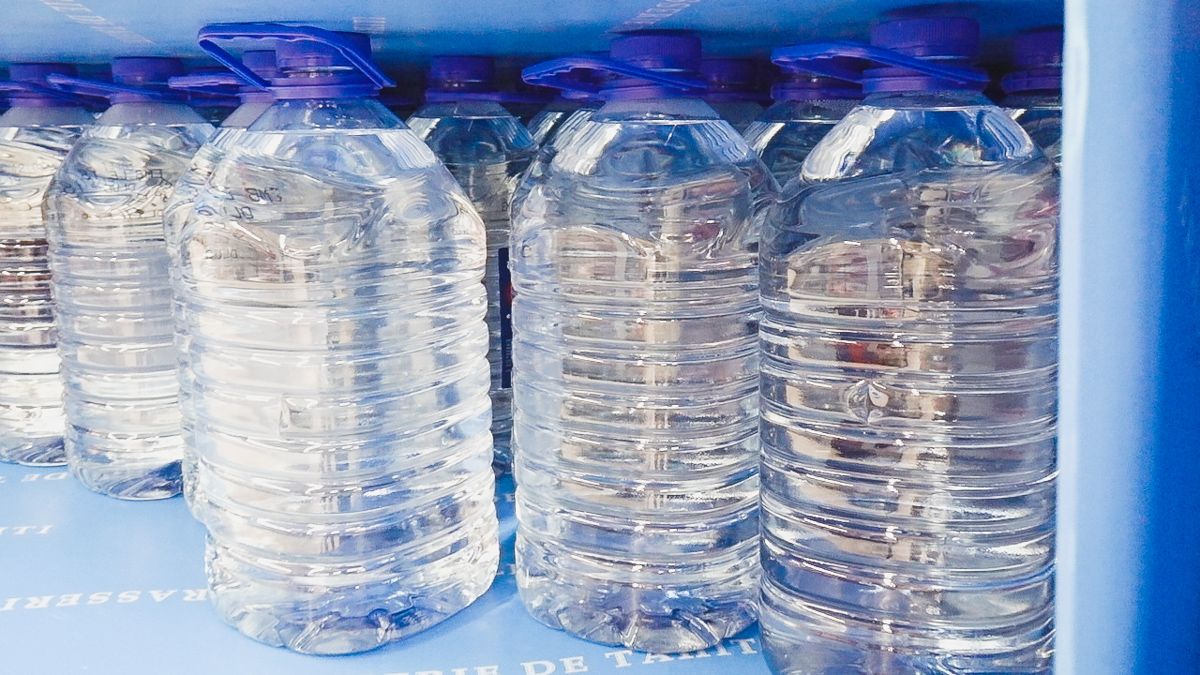
Buying bottled water is a serious environmental issue, it’s expensive, a pain to lug back to the boat, and it takes up valuable storage space. In all seriousness, we see a disturbing amount of plastic floating past us every day.
Just how much plastic is in our ocean?
In 2012 5Gyres gathered a group of scientists to find out. They determined that there were 269,000 metric tons and 5.25 trillion particles—enough to stretch to the moon and back, twice.
We really love the work and education that 5Gyres.org is doing. We love it so much we signed on as 5Gyres Ambassadors! If you want to learn more about the problems our ocean face and what you can do about it, please check them out. #plasticfree
The Cost Of Bottled Water
Aside from the environmental impact, it’s expensive too. As you noticed, the price of a 5 liter jug is 330CFP Franc. The average person should consume around ½ a gallon per day (2 liters).
- 2 liters a day per person x 365 days in a year = 730 liters
- That means we would need 146 of those 5 liter jugs.
- 146 5-liter jugs x 330 CFP Franc = 48,180
- 1 CFP Franc = 0.0095 USD
- 48,180 CFP = $457.72 USD
$457.72 A Year Per Person x two of us = $915.44
Not only is that $915.44 per year just in drinking, that is 3,102.5 pounds that have to be lugged to the boat. No thank you!
Watermaker – Taking The Salt Out of Sea Water
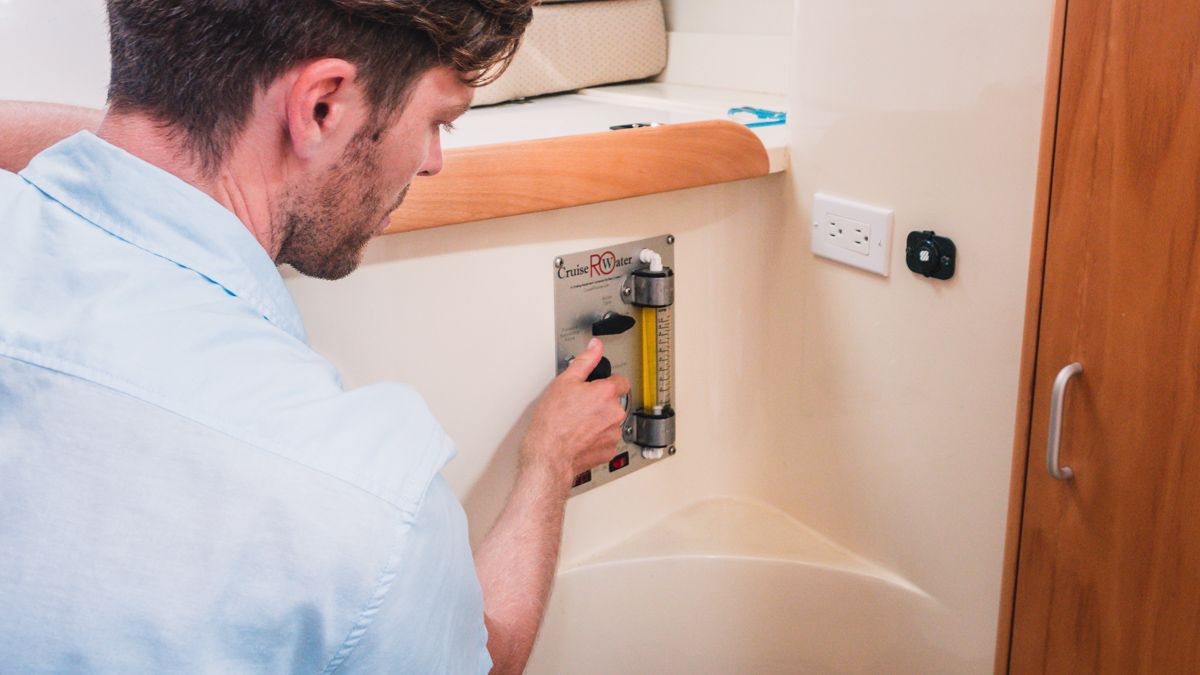
Watermakers are a sailor’s best friend. Using the fabulous technology of reverse osmosis, we can turn almost any water source (including salt water) into squeaky clean drinking water.
Our specific watermaker, Cruise RO, had been installed by the previous owner years ago. Which saved us from having to make the big decision of which watermaker to purchase. It has all been for the best, because we were looking at completely different (much more expensive) options because we were intimidated by the whole setup. Turns out, it’s far more simple to operate than we expected (thankfully). In other words if you are a newbie like us, don’t let it intimidate you.
Fun Fact: Big reverse osmosis systems are how many islands around the world get water.
- Watermaker Upsides
- Makes excellent tasting, high quality H20
- Most convenient
- Depending on your unit, they can be incredibly efficient.
- We have to run our generator but we can pump out 40 gallons an hour. That’s a weeks’ worth of cooking, cleaning, drinking, and a load of laundry in an hour! (we are pretty water efficient people…we’ll share those tips another day)
- Watermaker Downsides
- Hefty upfront investment
- Sizable installation space
- Uses a lot of power
- Requires an educated human to operate (AKA, read the manual).
- Some claim that because RO water removes everything, including any essential minerals the water may contain, it is not good. Which isn’t true. Essential minerals for our body should come from the food we eat and not from the water we drink. We’ve been drinking RO water for almost nine years now and haven’t had any concerns at all. (But there is a filter you can use to remineralizer the water if you are concerned.)
Are they worth it? Yes, worth every freaking penny and hour spent maintaining/repairing! The convenience and quality can’t be beat.
Ready For Part Two?
HOW WE MAKE SQUEAKY CLEAN WATER: gonewiththewynns.com/boat-life-squeaky-clean-water
🙏Gratitude!
Thank you so much for joining us!
Sharing this unsedentary lifestyle and what we learn along the way is possible because of viewers like you. If you like what you see, there are lots of FREE ways you can show your support. Thank you for being a part of the journey.
DON’T LISTEN TO PEOPLE ON THE INTERNET!
We always say, do your own research. So don’t just take our word for it (or anyone else’s). We’re always in a state of learning and new information comes out all the time. The more we all fact check and share information, the more informed we all are.
Here are some of the resources we use when learning about water:
- Wikipedia (loosely as it is crowd-sourced)
- Environmental Working Group (ewg.org)
- Environmental Protection Agency (epa.org)
- Centers for Disease Control and Prevention (cdc.gov)


